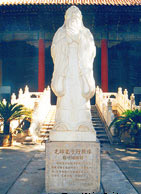| Legole.Com Discover china. Explore the beauty and wonder of the land, people, and culture of China. |
 |
|
|
 |
| |
 Confucius was the founder of Confucianism. He lived in Lu State (present Qufu City in Shandong Province) during the later part of the Spring and Autumn Period (770 BC - 476 BC) when the struggling for the domination of the country grew in intensity. Confucius was the founder of Confucianism. He lived in Lu State (present Qufu City in Shandong Province) during the later part of the Spring and Autumn Period (770 BC - 476 BC) when the struggling for the domination of the country grew in intensity.
In his young days, he served in the government. Because of the frustration of his political theory by the ruler of Lu, at the age of 35, he retired from his official life. For the next fourteen years, he traveled from state to state and presented his political idea to different rulers. However no one would listen to him. Though failed in politics, Confucius was esteemed as a great teacher and philosopher in history. By the age of 40, he set up an academy to popularize Confucianism and it was said that his students added up to over 3,000. In his career as a teacher, He permitted no discrimination on education and carried out among common people school education, which used to be privilege of ruling class.
In spite of the political and social turmoil of the era, scholars were found creative to cultivate different schools of thoughts in the most favorable climate. Confucius advocated a set of moral code on basis of five merits: benevolence, righteousness, propriety, wisdom and trustworthiness. Among them, benevolence was considered as the cornerstone, which stands for faithfulness, filial piety, tolerance and kindness. He said, "Do not do unto others what you would not want others to do unto you" and requested people to keep in good harmony with each other and establish a community ruled by standard manners and behavior.
In politics and economy, he suggested the ruler to implement clement policy and civilize his people. And he went against tyranny and random execution. At the same time, he forbade the violation of the superiority of the ruling class. He prescribed that the wife must be absolutely devoted to her husband, the son to his father and the ministers to their masters. In this way, he outlined the society with a distinction between the superior and the inferior, which he believed helped to restore orderly government.
Confucius was also known to have revised ancient literature as book of songs, book of changes and book of history and edited the first chronicle historical record, the Spring and Autumn Annals. Most of his sayings and teachings were collected and complied by his disciples in the book the Analects, which became the textbook for the later generations. However, no matter how great Confucius was, he still had his own weak points in personality. Confucius showed contempt towards businessmen and farmers. He looked down upon women, who were thus kept in low status in feudal society for 2,000 years.
Although Confucius gained no favor from ruling class in his days, he won popularity two centuries later in the Han Dynasty. From then on, his philosophy was established as orthodox by the emperors and he was worshipped as saint in China. Confucius Temple was built up in Qufu and other places in his honor.
|
|
|
 |
|
